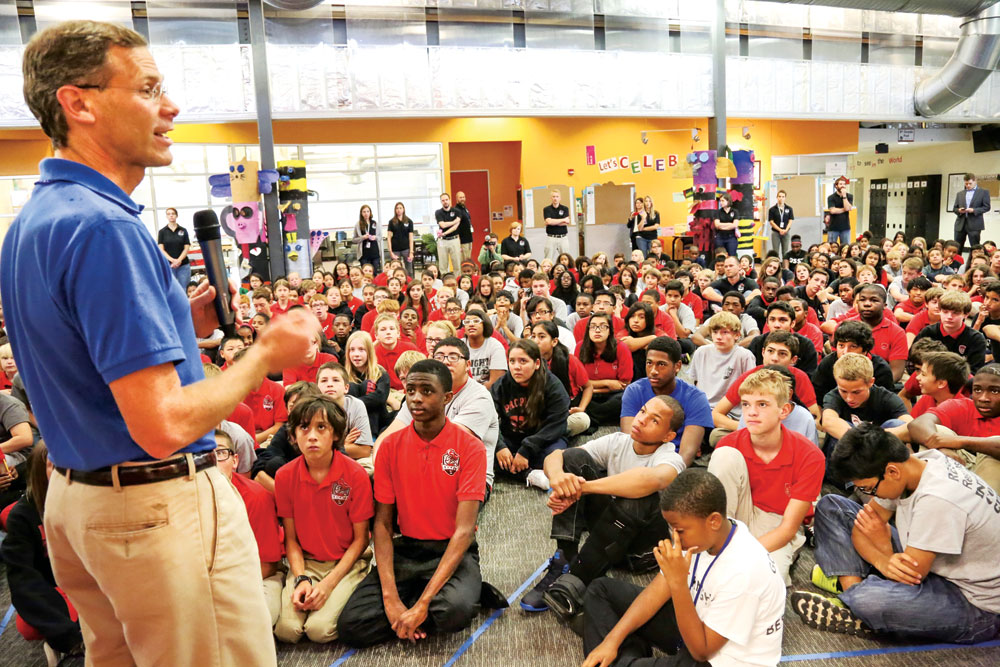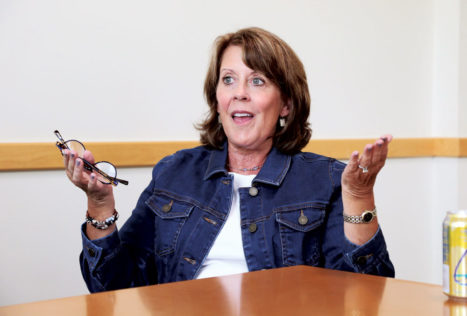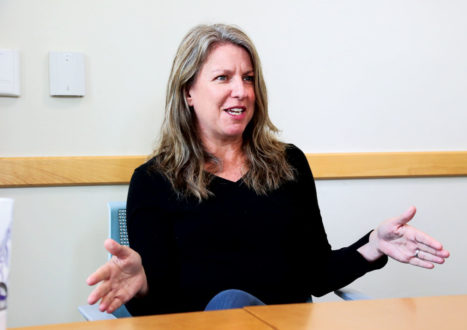
Tom Boasberg visited DSST:Stapleton Middle School in 2014 during the school’s celebration of having no achievement gap and having the second highest School Performance Framework Score in the City.
If all goes according to plan, Denver will welcome a new public schools superintendent by the end of the year. Current superintendent Tom Boasberg announced his departure in July, after nearly 10 years at the helm of a district that includes over 92,000 students.
The school board is seeking Boasberg’s successor by the end of this year. DPS has invited community input through mid-September and has engaged a search firm to facilitate the search. Candidates will be identified mid-September through October with finalist(s) selected in mid-October.
The Front Porch interviewed two local leaders who have extensive experience with education issues in our community about getting a new superintendent.
Laura Lefkowits is a former school board member, a leader in Park Hill Neighbors for Equity in Education (PHNEE) and grandmother of Stedman Elementary students.
Mary Seawell is also a former school board member, current senior vice president for education at the Gates Family Foundation, and a parent of George Washington High and Bill Roberts Elementary students.
What are some of the most important accomplishments for DPS during Boasberg’s tenure?
“I think he’s done a good job of getting at least a part of the community on board with DPS,” says Lefkowits. “I would call that the more elite of the community—fundraisers both locally and nationally, foundation heads, powers that be, as opposed to the grass roots in the district, which I think is maybe something that has been left behind.” Lefkowits also praises Boasberg’s implementation of more structured systems and accountability measures.

Former Denver School Board member Laura Lefkowits
For Seawell, Boasberg has demonstrated “a real commitment to equity …whether people think it’s been implemented well or not, every single meeting, every single document, every single speech is really centered around equity for all students.” Seawell also praises outcomes, including enrollment growth and retention, graduation rates, the focus on English Language Learners and the implementation of dual enrollment programs, where high school students can gain college credit in high school.
What are some areas of improvement for DPS?
“There is not a shared sense of vision and purpose in Denver around education. There are just so many factions. It is astounding to me, frankly,” says Seawell. “I don’t think I’ve ever seen an era where people define whether or not the school system is working by their own personal experience.” She feels it is incumbent upon DPS and its new leadership to foster a shared sense of purpose.
Lefkowits agrees. “The district under Tom’s leadership has fallen short of engaging the grassroots community. People have felt left out of many conversations, and that…promotes factionalism,” she says. It can promote reactionary responses too, she adds, where people think, “’If there’s one thing wrong, the whole system is wrong,’ as opposed to more of a feeling of ‘How can we get engaged?’”
Both Lefkowits and Seawell agree that greater school integration and attention to equity should be priorities going forward. But how that takes shape will become more clear in the choice of a new leader.
What is at stake in the choice of a new superintendent? What are the issues?
Seawell observes that DPS has been on a path towards greater decentralization, where schools and teachers have more control over testing, budgets, schedules and curriculum. “I think we’re starting to see an evolution at DPS. What will be interesting is if the school board—which has been very supportive of this, all seven members—sees this as something important in the next superintendent or if they want to go towards a more centralized district. Those are the two paths, and I think the superintendent search will tell us which vision the school board sees.”

Former Denver School Board member Mary Seawell
“It’s astounding to me. I don’t think I’ve ever seen an era where people define whether or not the
school system is working by their own personal experience.”
—Mary Seawell
“To me, the fundamental tension between centralized and decentralized has to do with equity and who’s accountable for equity,” says Lefkowits. “There’s a concept in the research about defined autonomy. The more responsibility and authority you give to a school, the more you have to define what they are responsible for and accountable for…it’s not just free rein.”
What about the process in selecting a superintendent?
Both former school board members agree that the school board’s most important responsibility is to make a wise choice, and both question how quickly the process is unfolding. “They just need more time. They definitely could find someone else to fill in… there’s nothing magic about October,” says Lefkowits.
And to voices in the community who are urging even greater transparency about the search, Lefkowits cautions, “Transparency is dictated by the law…DPS should put out a statement about “the way in which they’re limited and the respect they need to have for potential candidates who may … be currently in a superintendency.”


0 Comments